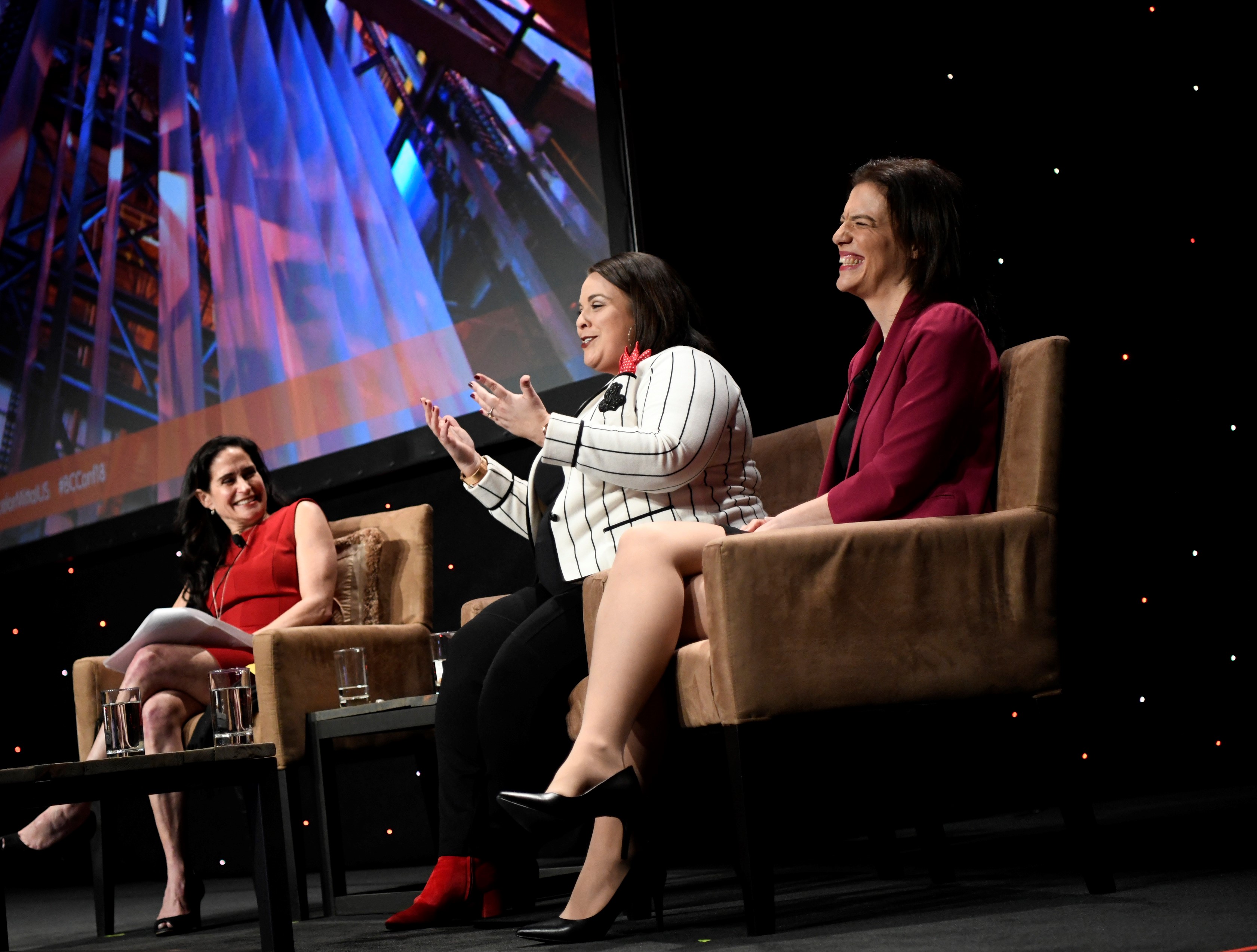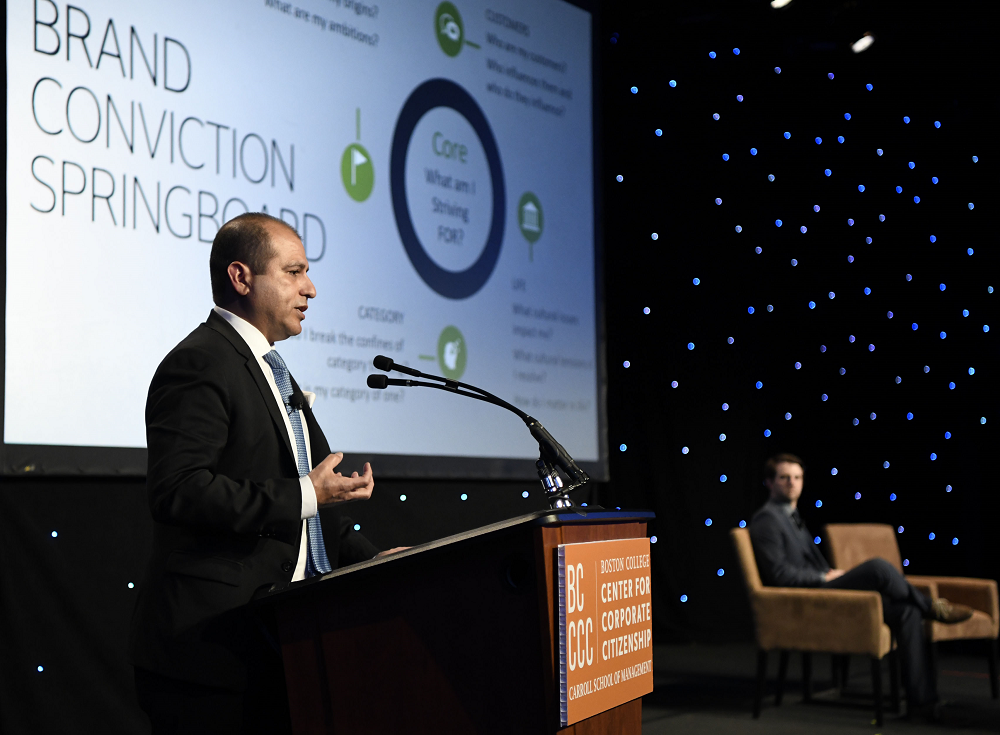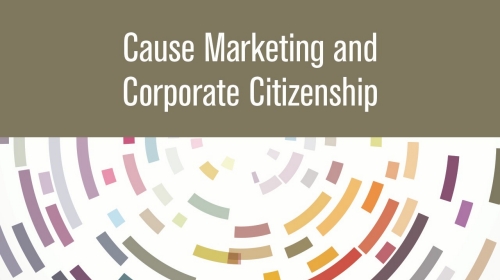 By the end of the first full day of the 2018 International Corporate Citizenship Conference, attendees had participated in panel discussions, workshops, case studies, networking events, and four inspiring keynote sessions. They closed the day leaving with practical tools and tactics to achieve resilience and results in their companies and communities through strategic responsibility.
By the end of the first full day of the 2018 International Corporate Citizenship Conference, attendees had participated in panel discussions, workshops, case studies, networking events, and four inspiring keynote sessions. They closed the day leaving with practical tools and tactics to achieve resilience and results in their companies and communities through strategic responsibility.
Structured Sharing and Forward Thinking
To kick off the afternoon, attendees took advantage of a second set of breakout sessions, featuring an USAA case study that focused on aligning corporate citizenship initiatives with business strategy, as well as workshop that offered tactics to enter and exit partnerships effectively. Other sessions focused on CSR reporting, internal collaboration, creating diverse and inclusive cultures, skills-based volunteering, achieving results through E, S, and G, and more.
The day’s third general session—titled From small changes to seismic shifts: The trends in corporate citizenship that will shape our business' future—was hosted by ArcelorMittal. There, Bill Steers, general manager of communications and corporate responsibility for ArcelorMittal’s Americas region, kicked off the keynote and introduced Marcy Twete, executive director of the ArcelorMittal USA Foundation and division manager of corporate responsibility for ArcelorMittal, Beth Spurgeon, USA corporate responsibility manager at ArcelorMittal, and leading CSR strategist Susan McPherson.
Together, these accomplished women discussed the trends, technologies, and policies that will affect the future of the corporate citizenship field, but first shared their own professional paths, and pointed to the importance of developing business skills to gain executive buy-in and build a strong business case.
“The Center’s Profile of the Professional report shows that CSR practitioners are investing more in their education and professional development, and are attaining advanced degrees in much higher numbers,” said Spurgeon. “This is translating to increased expertise at corporations and higher salaries.”
Punctuating their talk with great examples from Dell, Merck, Hilton, and more, the panel illustrated how companies can not only meet the expectations of their stakeholders, but also lead the charge in driving change. They also discussed the many pressures facing corporate citizenship professionals in a digital age, and explored the opportunities and challenges posed by rapidly evolving technologies.
“Digital transformation is happening in every industry—at ArcelorMittal we spend a lot of time thinking about how we can evolve in this space,” said Twete. “And we know we need to make sure we’re not just focusing on ourselves as we do so. As the trend of technological sophistication increases in companies, it will also in nonprofits. We’re going to require more of them. We ask them for more data, and more proof points, but not all nonprofits have reached that point, so it puts the onus on us to ask the questions that bring our partners along with us.“
Of course, the forces that shape the field of corporate citizenship aren’t limited to technological advances. During their session, the panelists also talked about the polices and regulations determining our future context, and the role of business in advocating for social progress.
“At ArcelorMittal, we are a big believer that regulations and administrations swing on a pendulum, and that it’s up to us as companies to stay the course with our CSR objectives,” said Spurgeon. “The key is to always remain transparent with your stakeholders.”
Aligning with one of the day’s themes, the group returned to the concept of agility to close their session. They shared examples of how the company has overcome challenges by remaining flexible and keeping an eye on the horizon.
“Agility means constantly thinking about the kinds of issues that are going from peripheral to hot button very quickly,” said Twete. “By building and maintaining strong relationships, you can remain nimble and succeed in dynamic situations.”
Evening networking and learning
 Following a packed day of sharing and learning, attendees were eager for a chance to connect and mingle with peers. At 5:00 p.m., they gathered together at The Beverly Hilton’s beautiful Aqua Star Pool for an evening reception sponsored by TJX, then closed the day closed with an inspiring session: Finding and promoting your brand's social purpose, hosted by BBVA Compass.
Following a packed day of sharing and learning, attendees were eager for a chance to connect and mingle with peers. At 5:00 p.m., they gathered together at The Beverly Hilton’s beautiful Aqua Star Pool for an evening reception sponsored by TJX, then closed the day closed with an inspiring session: Finding and promoting your brand's social purpose, hosted by BBVA Compass.
Drawing on their recent experience of re-writing the bank’s corporate responsibility and community investment playbook, J. Reymundo Ocañas, executive vice president and director of corporate responsibility & reputation for BBVA Compass, and Evan Matzen, senior vice president and director of corporate citizenship & reputation for BBVA Compass, shared their process for finding focus areas that align with company goals.
“Two years ago we went through an internal exercise to develop our new purpose,” said Ocañas. “We evaluated the key convictions that are at the core of what we are striving for as a company, and we developed a purpose manifesto that covers Company, Customers, Life, and Category.”
This purpose is informing the company’s digital transformation, which—as Ocañas pointed out—serves to advance its mission to bring the age of opportunity to everyone.
 “We live in the era of opportunities, where technology offers universal access to education and offers many more people than ever before the possibility of embarking on projects and chasing their dreams,” he said. “BBVA helps people make their dreams come true.”
“We live in the era of opportunities, where technology offers universal access to education and offers many more people than ever before the possibility of embarking on projects and chasing their dreams,” he said. “BBVA helps people make their dreams come true.”
By investing in the community, BBVA is also investing in their own resilience. Ocañas and Matzen highlighted a number of recent initiatives—such as the BBVA Microfinance Foundation and its sustainable finance commitment—which serve to strengthen and advance society.
“Our Pledge 2025 is a €100 billion plan to mobilize sustainable finance,” said Matzen. “We’re going to finance the transition to a low-carbon economy, and we’re going to do it in a way that aligns with the UN Sustainable Development Goals.”
The latter portion of the session focused a few programs that make use of the Bank’s key competencies, such as the BBVA Momentum initiative, a global intensive accelerator program that has been serving social entrepreneurs since 2011.
“BBVA Momentum includes seven months of online training and three in-person sessions, and this gives them the tools that they might not already have so they can be more successful with their social entrepreneurship, said Matzen. “Each entrepreneur has access to a BBVA Compass mentor who participates in the entire process and supports the entrepreneur.”
Matzen also discussed BBVA’s support of the Opportunity Fellows Program, which seeks to train diverse leaders from Community Development Financial Institutions (CDFI) to achieve transformative change in their communities.
The session was rich with enlightening examples and practical takeaways, all of which illustrated the importance of determining what your company stands for, and promoting that conviction strategically.
Want more updates on the Conference? Subscribe to the Corporate Citizenship Blog by clicking below.


 By the end of the first full day of the
By the end of the first full day of the  Following a packed day of sharing and learning, attendees were eager for a chance to connect and mingle with peers. At 5:00 p.m., they gathered together at The Beverly Hilton’s beautiful Aqua Star Pool for an
Following a packed day of sharing and learning, attendees were eager for a chance to connect and mingle with peers. At 5:00 p.m., they gathered together at The Beverly Hilton’s beautiful Aqua Star Pool for an  “We live in the era of opportunities, where technology offers universal access to education and offers many more people than ever before the possibility of embarking on projects and chasing their dreams,” he said. “BBVA helps people make their dreams come true.”
“We live in the era of opportunities, where technology offers universal access to education and offers many more people than ever before the possibility of embarking on projects and chasing their dreams,” he said. “BBVA helps people make their dreams come true.”







